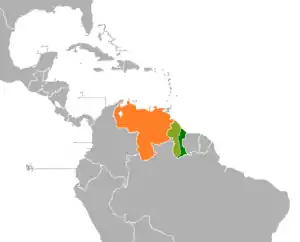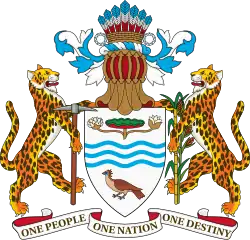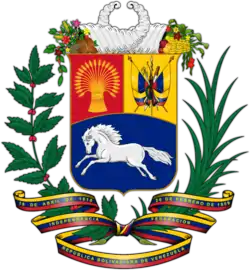Guyana–Venezuela relations
Guyana – Venezuela relations include diplomatic, economic and other interactions between the neighboring countries of the Co-operative Republic of Guyana and the Bolivarian Republic of Venezuela.
 | |
Guyana |
Venezuela |
|---|---|
Border dispute
Venezuela claimed more than half of the territory of the British colony of Guyana at the time of the Latin American wars of independence. Guyana argues that the boundary between the nations was clarified in the Arbitral Award of 1899 signed by Guyana, whereas Venezuela called the award an “Anglo-Russian conspiracy.” [1] In 1962 Venezuela declared that it would no longer abide by the arbitration decision, which ceded mineral-rich territory in the Orinoco basin to Guyana. The disputed area is called Guayana Esequiba by Venezuela. A border commission was set up in 1966 with representatives from Guyana, Venezuela and the United Kingdom, but failed to reach agreement. Venezuela vetoed Guyana's bid to become a member of the Organization of American States (OAS) in 1967. In 1969 Venezuela backed an abortive uprising in the disputed area.
Under intense diplomatic pressure, Venezuela agreed in 1970 to a 12-year moratorium on the dispute with the Protocol of Port-of-Spain. In 1981, Venezuela refused to renew the protocol. However, with changes to the governments of both countries, relations improved, to the extent that Venezuela sponsored Guyana's 1990 bid for OAS membership.[2][3]
In 2013 the Venezuelan navy seized an oil exploration vessel operating in disputed waters claimed as Exclusive Economic Zones by both Venezuela and Guyana.[4]In taking the case to the ICJ, Guyana looks to authorize the division of the area with Venezuela. The zone at issue is west of Guyana's Essequibo River. The disclosure of oil off the coast has started a discussion among Guyana and Venezuela over the border itself with both area claiming the area.[1]
The dispute was taken to the International Court of Justice (ICJ) in 2018.[5] Venezuela did not participate in the hearing that was held on June 30, 2020, arguing that the ICJ did not have jurisdiction.[6] In September 2020, the United States announced that it would join Guyana on sea patrols in the area.[7] UN Secretary-General António Guterres alluded the case to the ICJ in 2018. Pressures additionally heightened when Venezuela's naval force held onto an oil research transport in 2013 and moved toward another in 2018.[1]
See also
References
- Griffith, Ivelaw Lloyd (October 28, 2020). "Elections and the Imperatives of Geopolitical Neighborhoods". Report – via JSTOR.
- "Relations with Venezuela". U.S. Library of Congress. Retrieved 2009-06-09.
- "The Trail Of Diplomacy". Guyana News and Information. Retrieved 2009-06-09.
- SANCHEZ, FABIOLA (13 October 2013). "Venezuela navy escorts seized oil vessel into port". ap.org. Associated Press. Retrieved 13 October 2013.
- "Guyana lleva a Venezuela a la Corte Internacional de Justicia de La Haya en la disputa por el territorio del Esequibo". BBC News Mundo (in Spanish). BBC. 29 March 2018. Retrieved Sep 19, 2020.
- Staff, Reuters (30 June 2020). "Guyana asks World Court to confirm border with Venezuela". Reuters. Reuters. Retrieved Sep 19, 2020.
- "U.S., Guyana to launch joint maritime patrols near disputed Venezuela border". news.yahoo.com. Reuters. September 18, 2020. Retrieved Sep 19, 2020.
External links
- Tim Johnson (November 27, 1999). "Tensions rising in Venezuela-Guyana territorial dispute". Miami Herald. Retrieved 2009-06-09.
- Gordon French (October 11, 2006). "Guyana/Venezuela teams meet as police release interim report on miner's killing". Caribbean Net News. Archived from the original on 2008-06-23. Retrieved 2009-06-09.
- "Venezuela's Claim to Most of Guyana Is Alive Again as Moratorium Ends". New York Times. June 21, 1982. Retrieved 2009-06-09.
- "Venezuela and Guyana". Federal Research Division of the Library of Congress. December 1990. Retrieved 2009-06-09.
- "Guyana Claims Venezuela Blew Up Dredges". San Francisco Chronicle. November 16, 2007. Retrieved 2009-06-09.
- Jacqueline Anne Braveboy-Wagner (1984). The Venezuela-Guyana border dispute: Britain's colonial legacy in Latin America. Westview Press. ISBN 0-86531-953-7.

